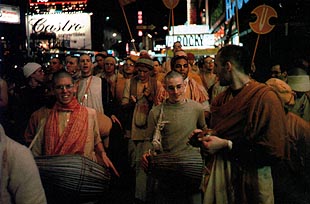 Inspired by my readings of "Contemplative Prayer" and "Contemplation In A World Of Action" by Thomas Merton
Inspired by my readings of "Contemplative Prayer" and "Contemplation In A World Of Action" by Thomas MertonIn the opening chapter of
Contemplation In A World Of Action, Merton speaks about the concerns of the monastic renewal occurring across the Christian world in the period following WWII.
He makes it clear that there are few sure answers on how to restore the monastic life in the Western world, saying that there must be a balance between a moderb updating of the institutional and the external structures, while keeping at the essence the focus on the internal spiritual development of the fortunate individuals who have taken to their calling from God.
Above all, he calls for a re-focusing on the engagement of the monk with the secular world in service, making sure that the new orders do not fall into the previous traps of becoming "retirement homes."
We face a similar process of monastic renewal in ISKCON, especially in North America, where a small but brave group of souls attempt to restore the peerless purity of
brahmacari life in service to Srila Prabhupada.
In the three short weeks since I've been here at the Bhaktivedanta Ashram on the Lower East Side of Manhattan, the feeling is strong that we are on the cusp of a real explosion of outreach and connection with the spiritual peoples of this concrete jungle.
We've even been inspired by the association of HG Ramesvar Prabhu, Prabhupada disciple and former BBT head, who said to us that the flavor and potency of our ashram fills his heart with the same mood of his glorious days with Prabhupada. We do all we can to live up to such lofty standards.
Merton's own insights into a healthy, vibrant monastic atmosphere parallel the mood we are trying to create, as individual renunciates and as a community. He writes:
"The charism of the monastic life is the freedom and peace of a wilderness existence, a return to the desert that is also a recovery of inner paradise. This is the secret of monastic 'renunciation of the world'. Not a denunciation, not a denigration, not a precipitous flight, a resentful withdrawal, but a liberation...The monk simply discards the useless and tedious baggage of vain concerns and devotes himself henceforth to the one thing that he really wants: the quest for meaning and for love, the quest for his own identity, his secret name promised by God"In the wilderness of Manhattan, we echo in action Merton's pleas for the balance of the external and internal: a desperate, focused intensity on our
sadhana, combined with traditional outreach such as book distribution and college outreach spiced with bold and aggressive progressive programs such as our Tuesday and Fridays "Experience Transcendence" community get-togethers, as well as spiritual newspapers and open mics.
Above all, inspired by the love and brotherhood represented by the
brahmacaris of
ISKCON Chowpatty under the guidance of HH Radhanath Swami, we strive to create the same bonds of care and intimacy, automatically attractive, just like Krsna, to anyone who wants to experience it.
Merton writes of community:
"The monastic charism is not, however, one of pure solitude without any community. It is also a charism of brotherhood in the wilderness...This closeness is understood as being, at least ideally, a very human and warm relationship...a grace of communion in a shared quest and a participated light...of special love and of mutual aid in the attainment of a difficult end...Monsatic work, obediance, poverty, chastity, are all in some way colored and tempered by the communal charism of brotherhood in pilgrimage and in hope."It is essential and clear that, in this age of quarrel and hypocrisy, that if we don't restore and\or create the community of
brahmacarya, then it will be quickly swallowed up the vagaries of attractions and attachments.
Merton also hits the nail on the head to the mood of our ashram when he writes:
"The new monastic communities will need to be much more democratic than in the past. The abbot will have to be a spiritual father, not a prelate, a police chief and a corporation president rolled into one. The monks will have to have much more initiative in running their own lives...The superior can no longer arrogate to himself the right to do all his subjects' thinking for them and make all their decisions for them."In our own ashram, HG Yajna Purusa Prabhu gives us fully his heart and his wisdom in leadership, soft as a loving father but secure and strong enough in his own convictions to provide this ideal vision and to prevent it from coming out of balance. He lets us explore our own individual talents and capacities in service to Krsna whilst always making sure we never stray from our core.
As you may be able to understand, my inspiration in all this sharing of the soul of Merton is that his writings are clearly in line with the vision and mood of what I am experiencing now here in NYC, and with what we as a community are trying to do.
His vision is universal, mature, and dynamic, and holds no major conflict with Prabhupada's own vision of a powerful
brahmacari force spreading Krsna Consciousness far and wide in the Western world. We simply and humbly walk in their footsteps.
Check out our website at
www.krishnanyc.com
 http://wcbstv.com/cbs2crew/nyu.protest.police.2.939419.html
http://wcbstv.com/cbs2crew/nyu.protest.police.2.939419.html

